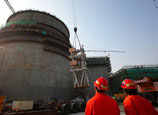
Trade in services will account for about 25 percent of the city's total imports and exports, compared with 22.1 percent in 2010, and greater emphasis will be placed on helping domestic businesses to build up their ability to withstand international economic risks and managing their international operations with a view toward nurturing world-class indigenous multinationals.
"The global economy is warming up gradually with obvious recovery, and this will be a good opportunity for Shanghai to attract more high-end overseas enterprises to bring their offices to the city and boost Shanghai's economy," Huang said.
Modern shipping services will be significantly improved, and the city will acquire all the core functions of an international trade center, with total merchandise sales amounting to 10 trillion yuan ($1.6 trillion).
"It will be a challenging restructuring process in the next five years to reach the goal of doubling the 2010 GDP and per capita income by 2020, but it looks promising that we will achieve this through the detailed tasks listed in the report," Huang said.
The modern service sector, one of the city's focal points, will be boosted vigorously with the development of financial markets and products by attracting more corporate headquarters and departments of financial institutions.
"Customer service in Shanghai is still not as good as in international cities like New York, London and Paris, and it will take time for the city to improve its service sector along with its economic development," said Liu Xiaobing, a professor at the School of Public Economics and Administration at Shanghai University of Finance and Economics.

















 Buildings collapse after subsidence in S China
Buildings collapse after subsidence in S China


![]()
